
It was the summer of 1989, and the most ambitious greenhouse complex in Quebec was being built.
It was the summer of 1989, and the most ambitious greenhouse complex in Quebec was being built.
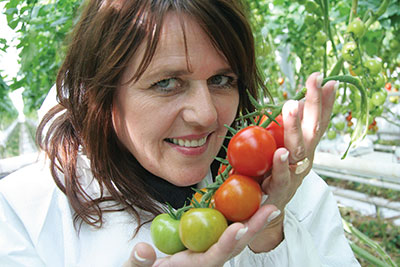 |
|
| Marie Gosselin, 2014 Méritas Gilles-Bordeleau recipient. Advertisement
|
Les Serres du St-Laurent’s Portneuf location would be a then massive three hectares and use artificial lighting to grow tomatoes year-round. The lighting technology was new and new ideas would be needed to market the tomatoes. In came Marie Gosselin.
Fresh out of university, Gosselin was hired to manage sales and marketing. Twenty-four years later, she is now president and CEO. The Savoura brand she created now accounts for 50 per cent of fresh tomato sales in Quebec. With a business turnover of $25 million, some 225 employees and 14 hectares of greenhouses in four locations, Gosselin is at the helm of the province’s busiest greenhouse production company.
This past February, Gosselin was awarded the Méritas Gilles-Bordeleau for her contribution to the Quebec greenhouse sector. The honour comes from her peers at the Syndicat des producteurs en serre du Québec, the provincial greenhouse growers’ association.
Gosselin’s story is the story of the Savoura tomato, the first – and still one of the few – fresh produce products to have strong branding in Canada. And it all started with a passion for horticulture marketing that was first sparked at age 14.
Her father, Fernand Gosselin, owned a potato growing and packaging business in the Quebec City area. ‘‘Every Saturday, we would visit the potato fields with our dad. I always thought that one day I would take over,’’ Gosselin said, speaking with Greenhouse Canada magazine.
One of the farm workers was from a family of strawberry growers on nearby Orléans Island. He suggested some of the fields be used to grow strawberries.
STARTING YOUNG WITH FIRST BUSINESS VENTURE
Fernand Gosselin liked the idea and put his two teenage daughters and their younger brother in charge of sales. They sold the strawberries at public markets and set up several roadside stands, hiring friends and other students to staff them.
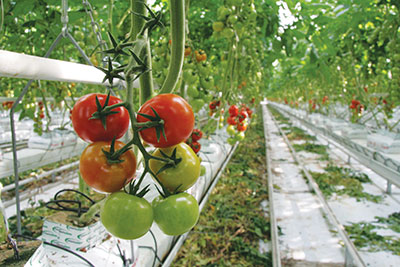 |
|
| Success with branding.
|
‘‘We bought the strawberries and sold them. At the end of the day, we had to have enough sales to pay our staff and the rent for the stands. It was a real business and a great school. I started to understand all about consumer behaviour, supply and orders, price adjustment and most importantly, why consumers bought our strawberries and not the neighbours,’’ Gosselin recalls.
This learning experience was just as beneficial as her management and agronomy studies at Laval University.
But halfway through her undergrad, her life plans were shattered. Her father received an offer he couldn’t refuse and sold his potato business.
‘‘I was very disappointed,’’ Gosselin said. ‘‘My goal had been to take over the business from my father. There were lots of tears, but I had to accept it.’’
FAMILY WELCOMED CHANCE TO INVEST IN NEW GREENHOUSE
However, it wasn’t long before Gosselin’s father was approached to invest in a greenhouse project that involved lighting technology developed at her university. ‘‘I told myself: I want to be in charge of marketing these tomatoes.’’
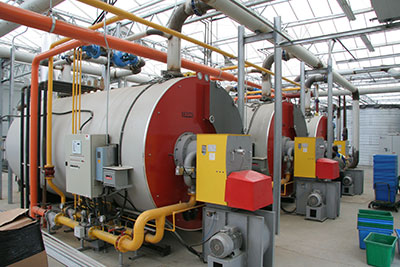 |
|
| The three boilers at Saint-Étienne-des-Grés may operate on natural gas (yellow pipes) or biogas (orange pipes) from the nearby landfill.
|
Upon finishing her undergraduate studies, she was hired by the marketing firm conducting a market study for the new company.
That summer, some 1,000 interviews were conducted in supermarkets across the province. Once the greenhouse in Portneuf was operational, Gosselin got the sales and marketing position she wanted.
‘‘My vision right from the start was to brand our tomato,’’ she said. ‘‘I was just out of university, applying naively the theory I had learned.
“At first, buyers didn’t understand what I was talking about. For the first 10 years, we had to work really hard to convince buyers and have consumers recognize our product.’’
Being a young woman using innovative marketing strategies to sell produce was sometimes met with resistance and odd comments, but Gosselin thinks that in the end, her different way of thinking was very useful.
In 24 years, the branding has remained pretty much the same: the Savoura tomato is a tasty, local product.
FOCUS HAS ALWAYS BEEN ON TASTE
‘‘Everything we do is about taste,’’ Gosselin says. ‘‘We don’t use the same varieties as in Ontario or Mexico. Sometimes, we choose taste over yield.’’
Taste is also a matter of freshness, she points out, and imports from Mexico can’t beat a Savoura tomato that often reaches the store less than 24 hours after being picked.
NEWEST GREENHOUSE HEATED BY BIOGAS FROM LOCAL LANDFILL
Les Serres du St-Laurent now operates four greenhouse complexes, the largest and latest one being the 5.2-hectare Saint-Étienne-des-Grés location, where most of the heating energy is biogas from the nearby landfill. Tomatoes are sold mostly in Quebec, but also in Ontario and in modest quantities in the U.S.
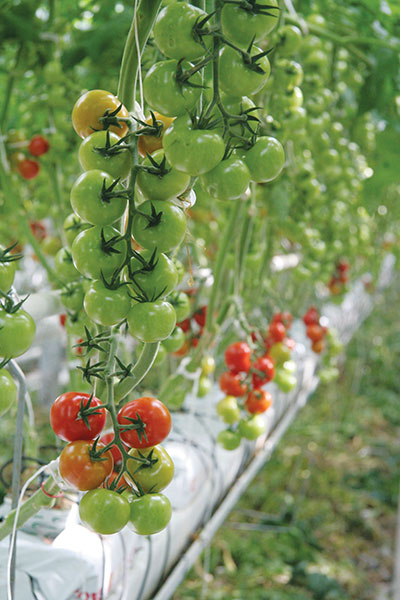 |
|
| Savoura’s success in branding its tomatoes took years of commitment.
|
Over the past few years, the company has sold some of its older greenhouses, in order to focus on lowering costs using its most modern facilities.
Doubling the size of the Saint-Étienne-des-Grés greenhouses has been in the air for several years, but issues with the quality and quantity of biogas supplied by the landfill site have delayed the project.
Today, Gosselin spends more than half of her time on the road, supporting her sales team. She likes to receive first-hand comments from consumers and store produce managers.
This winter’s cold temperatures have forced extensive use of energy curtains, cutting off light and slowing production. Savoura tomatoes were in short supply and Gosselin had to deal with a few unhappy clients.
Gosselin spends another 30 to 40 per cent of her time inside the greenhouses, using her agronomist knowledge to help plan production and solve problems. All greenhouses deliver tomatoes year-round, without interruption.
Teamwork is one of the company’s greatest strengths, Gosselin says. She describes herself a results-oriented person, who demands a lot from others but who also has a heart.
“AN IRON HAND IN A VELVET GLOVE”
‘‘An iron hand in a velvet glove. That may sound contradictory, but I think that’s how people around me would describe me.’’
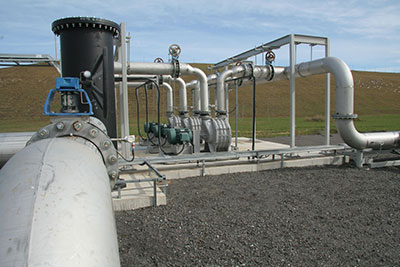 |
|
| Now that technical and legal issues regarding the supply of biogas from the municipal authority managing the landfill site are resolved, Savoura can look at expanding its Saint-Étienne-des-Grés complex.
|
When the topics of expansion and market shares surface, Gosselin blurs the line between her company and her local competitors. Quebec greenhouse production is still not taking all the space it should in local supermarkets, she says.
‘‘We need to pull together, unite our forces and become more present in our own market,’’ she says.
‘‘We need more greenhouses and they have to be 10 or 15-hectare projects. I see no other way to be competitive in this market.’’
Lower electricity rates are what Quebec growers need if they are to expand, Gosselin believes.
Hydro-Quebec has recently introduced a special option for ‘‘photosynthesis lighting,’’ but it is not enough.
Industrial users like aluminum smelters enjoy much better rates, Gosselin says. ‘‘We need low rates for greenhouses. Mexicans have sun and cheap labour. We have cheap electricity and we have to use it to create wealth.’’
André Dumont is a Quebec freelance writer and photographer.
Print this page